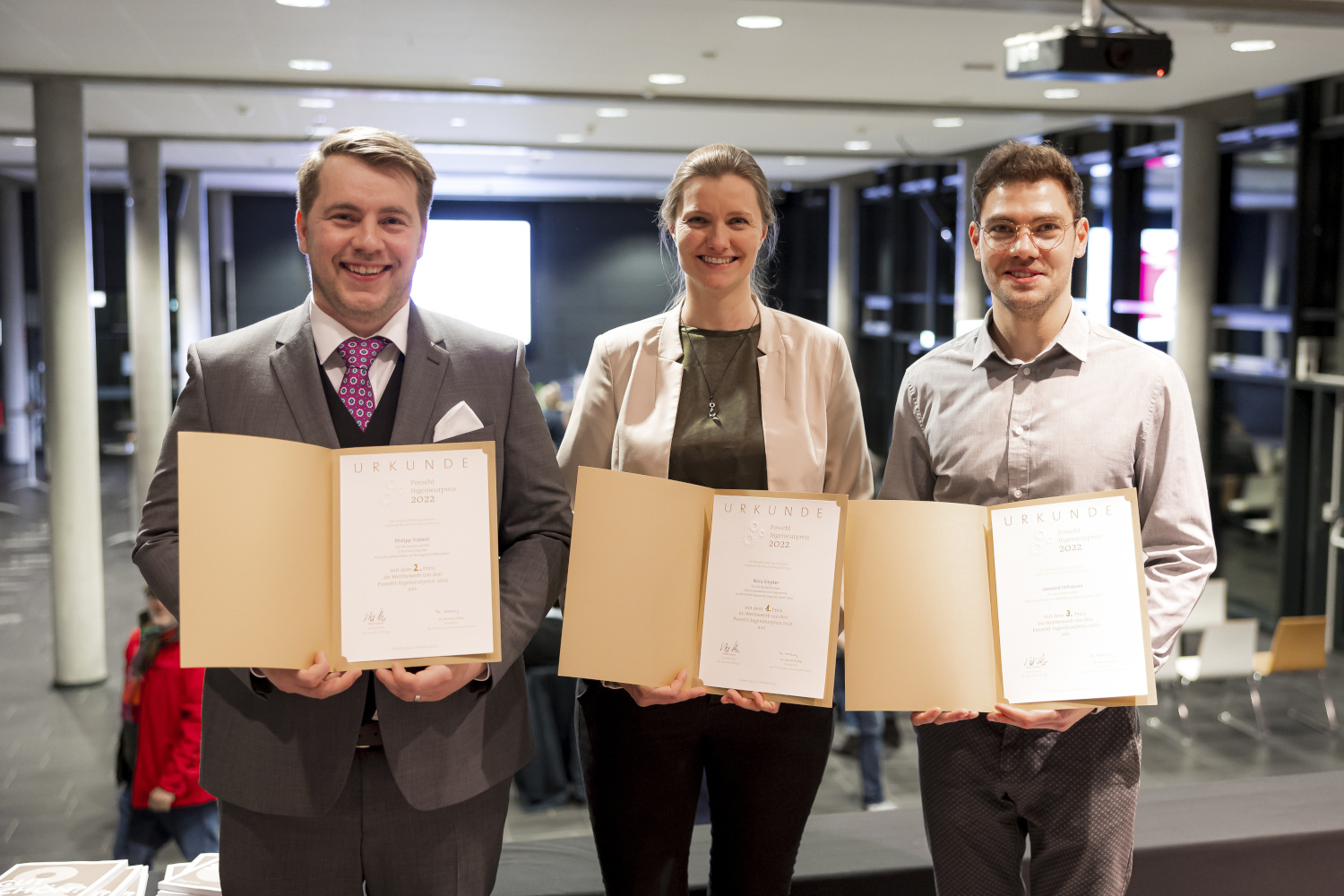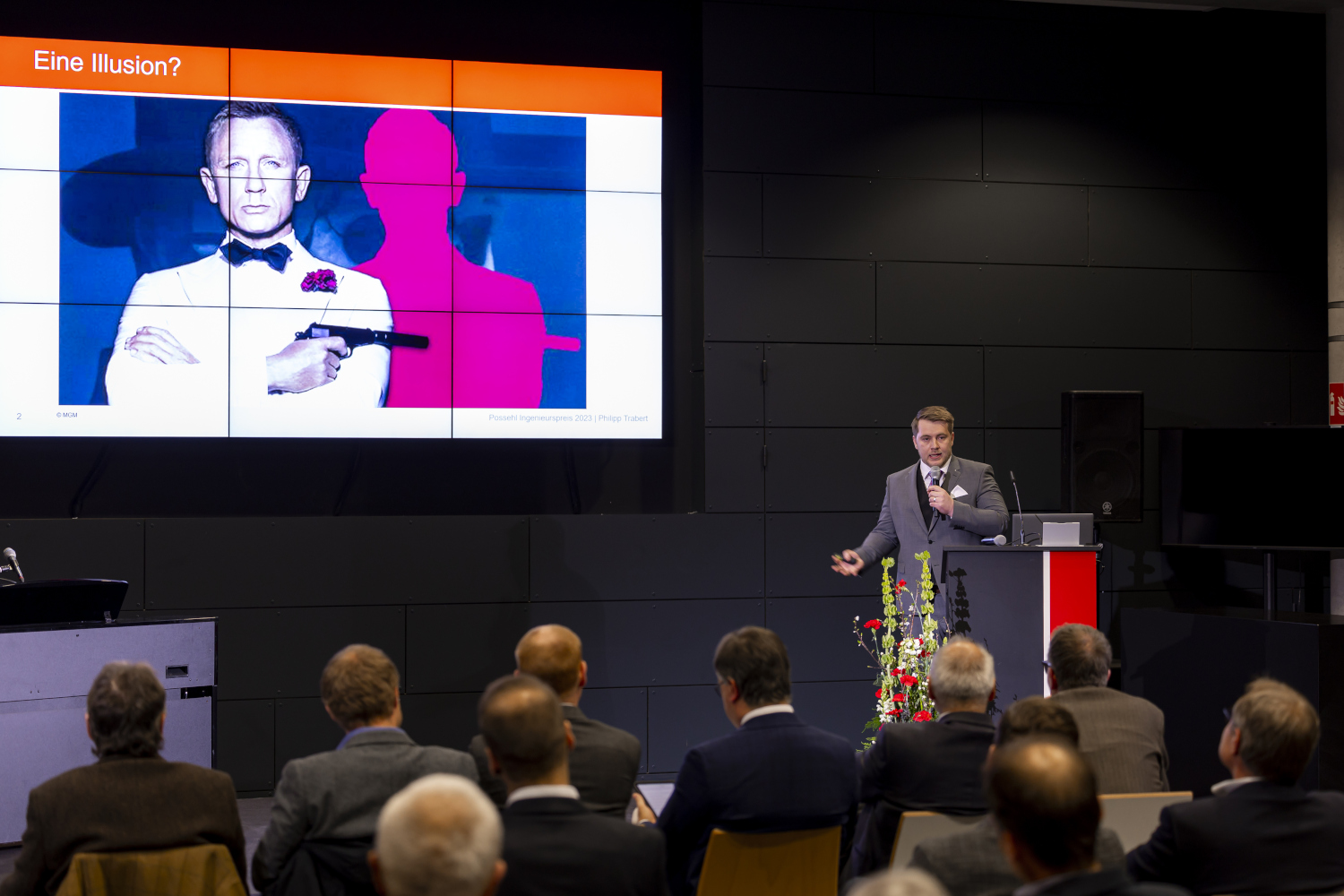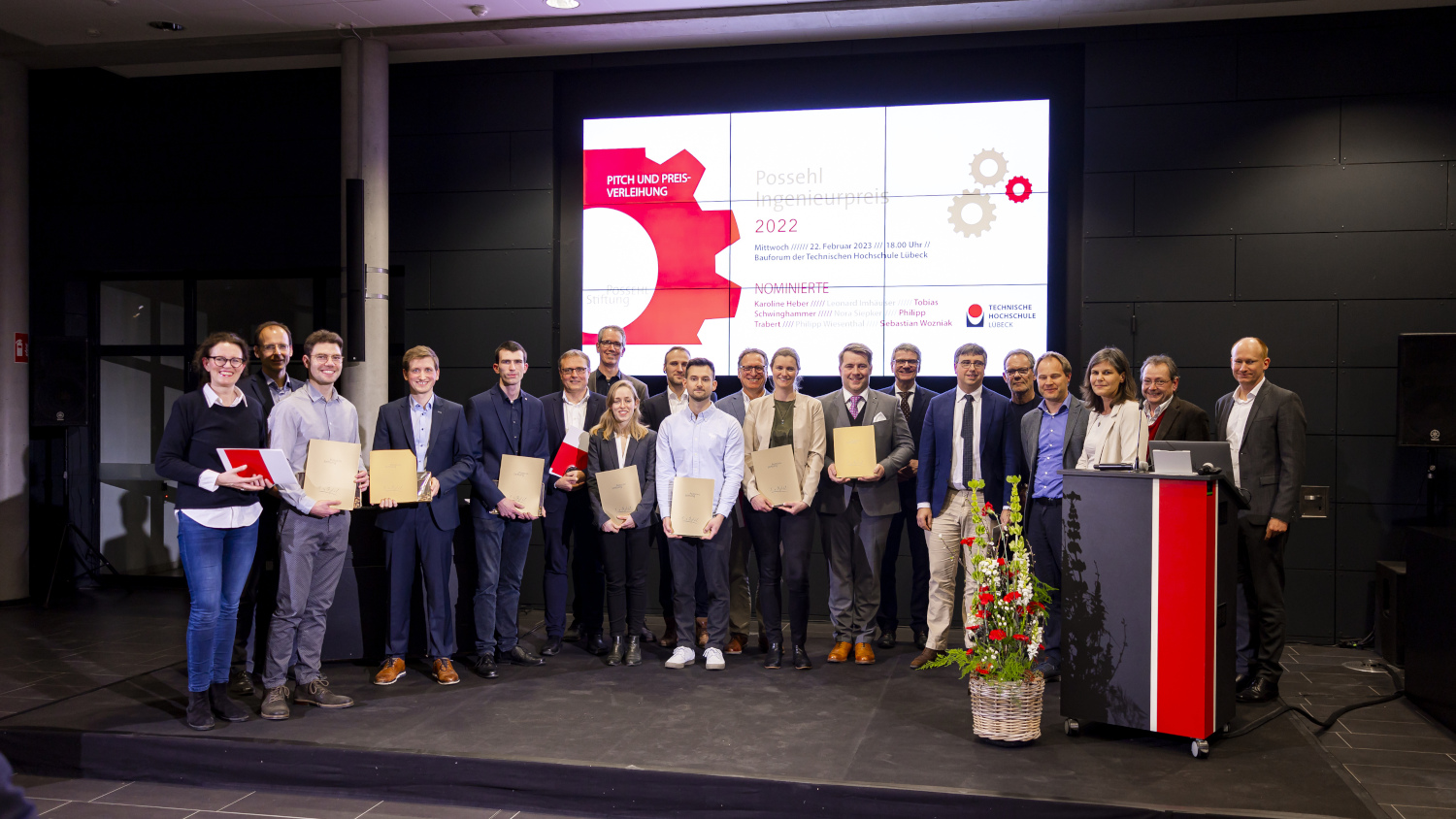
Menu
They remove algae from lakes, investigate silencers for hunting rifles and make music more enjoyable.
Nora Siepker convinced the jury with her outstanding dissertation and an entertaining pitch about the “Analysis of the potential of algae harvesting for the remediation of eutrophic lakes”. On 22 February 2023 she took first place in the competition for the Possehl Engineering Prize 2022.
Philipp Trabert came in second with his dissertation, “Examination of the directional characteristics of silencers for civilian hunting rifles”, closely followed by Leonard Imhäuser, who took third place with his dissertation on the “Music preference of bimodal cochlear implant users”.
 Left to right: Philipp Trabert, Nora Siepker & Leonard Imhäuser © Felix König, Fotoagentur 54°
Left to right: Philipp Trabert, Nora Siepker & Leonard Imhäuser © Felix König, Fotoagentur 54°
 The students presented their dissertations for the first time in 5-minute pitches before roughly 100 guests and a jury, which then chose the best pieces of work and awarded the prizes: €5,000 for first place, €3,000 for second, and €2,000 for third place. Karoline Heber, Tobias Schwinghammer, Philipp Wiesenthal and Sebastian Wozniak all received a certificate, and were delighted to have been voted the best in their year and selected to take part in the competition.
The students presented their dissertations for the first time in 5-minute pitches before roughly 100 guests and a jury, which then chose the best pieces of work and awarded the prizes: €5,000 for first place, €3,000 for second, and €2,000 for third place. Karoline Heber, Tobias Schwinghammer, Philipp Wiesenthal and Sebastian Wozniak all received a certificate, and were delighted to have been voted the best in their year and selected to take part in the competition.
1st place: Nora Siepker
The winner Nora Siepker was able to convey a complex subject to the audience in her pitch. She graduated from Lübeck Technical University with a bachelor’s degree in Environmental Engineering and Management, and wrote her dissertation on the “Analysis of the potential of algae harvesting for the remediation of eutrophic lakes”. It is connected to a doctoral thesis being carried out at Kiel University, in which methods are investigated for harvesting microalgae from eutrophied lakes, i.e. lakes which have been enriched with nutrients.
The author is tackling a familiar problem: over two thirds of the lakes in Germany had excessive phosphate concentrations in 2015. This encourages extreme algal growth, known as algal blooms, which may result in the death of many organisms in a lake. Harvesting the algae – which have absorbed the phosphate as they grow – is intended to be an indirect way of removing the phosphate. In her bachelor’s dissertation Nora Siepker used a software tool to determine the amount of phosphate that could be removed by the harvest, depending on the filtration method used. Her results show the advantages of the respective filtration methods and which could even be more energy-efficient. She also analysed ways of using the biomass, which is rich in nutrients. Applications might include an algae paste, a base substance for fertilisers or an additive for insulating materials. “The holistic approach that she took in her work made a lasting impression on the jury”, said Prof. Andreas Schäfer, who chaired the jury. In the course of her research work she was also in touch with tourist organisations and lakes used for swimming, like the Lübeck Lido at the Krähenteich.
2nd place: Philipp Trabert
Philipp Trabert completed his bachelor’s degree with a dissertation entitled, “Examination of the directional characteristics of silencers for civilian hunting rifles”. In his work he looks at the effectiveness of silencers on civilian hunting rifles. Previous measurements and standards did not take into account the extent to which noise reduction is dependent on the direction. This information is an indication of how effective the protection is for the hunter, for people nearby and also for hunting dogs. Philipp Trabert built a complex set of measuring devices at a shooting range. The measurements he obtained enabled Trabert to recommend certain silencers and to describe a more comprehensive new test for measuring muzzle noise. His work has already caught the attention of the German army, which was one reason for the jury to award him second place, in addition to the work’s thoroughness and practical importance.
3rd place: Leonard Imhäuser
The graduate Leonard Imhäuser wrote his dissertation about the “Music preference of bimodal cochlear implant users” in cooperation with the University Hospital Schleswig-Holstein and the Acoustics Institute at Lübeck University. He worked with cochlear implants (CI) which give people with severe hearing difficulties the chance to understand language again and so to improve their social interactions. Commercially available implants are optimised for understanding language, however. Listening to music with a CI is often more difficult. Wearers find it hard to distinguish different tones and cannot tell different instruments apart, or only poorly. Imhäuser used a signal processing method for the first time that was originally developed for the music industry, in order to increase the enjoyment of music for CI wearers. He concentrated on presenting the singing voice as louder than the accompanying instruments. In tests with volunteers that he conducted himself, one of Imhäuser’s findings was that CI wearers actually preferred the music with the singing voice emphasised, compared with a larger group of people with normal hearing. “Your work can increase people’s quality of life. That deserves a prize”, emphasised the jury chair.
This round of awards showed the great diversity of the topics covered by students at Lübeck Technical University.

Dr Muriel Helbig, President of Lübeck Technical University, was joined by Max Schön and Prof. Klaus-Peter Wolf-Regett, the Deputy Chair of the Possehl Foundation, to present the four certificates and three prizes. This year another special feature was that the students who did not receive a Possehl Engineering Prize, together with their respective tutors, were given a team award in the form of certificates and a small present.
The singer-songwriter Katharina Schwerk accompanied the event in the Bauforum with her warm soul voice and own songs.
Possehl Foundation Lübeck
Beckergrube 38 – 52
D-23552 Lübeck
E-Mail: possehl-stiftung(at)possehl.de
Tel.: +49 (0)451 148-200
More about the Foundation
Here you can find our annual reports, Emil Possehl’s will, our art catalogues and publications to mark the 100th jubilee of the foundation.
Our articles of association
The Foundation only supports non-profit and charitable causes and “promotes all that is good and beautiful in Lübeck”.